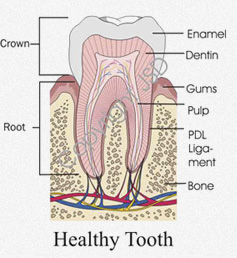Endodontics is a specialty in dentistry that focuses on diseases of the dental pulp and its supporting structures. Endodontists are dentists with special post-graduate training in this field. Endodontists are also experienced at finding the cause of oral and facial pain that may be difficult to diagnose.
Although general dentists can perform endodontic treatment, patients are often referred to an Endodontist when the case is complicated or more difficult than usual.
What is an Endodontist?
An Endodontist is a dentist who has undergone a minimum of 2 years of extra postgraduate training. The specialty training allows an Endodontist to:
- deal with diseases of the dental pulp and supporting structures
- diagnose facial pain and related problems
Aside from providing treatment, Dr. Dietz’s role is also that of an educator. It is important that patients understand why they require treatment, what treatment involves, and what they can do to ensure the best possible outcome. Dr. Dietz believes that a properly informed patient has the best chance of achieving the optimal result.
What is Endodontic treatment?
 In order to understand endodontic treatment, it helps to know something about the anatomy of a tooth. Teeth have several layers. The outside layer of the tooth is composed of a hard layer called enamel. Enamel is supported by an inner layer called dentin, which has at its center a soft tissue known as the pulp.
In order to understand endodontic treatment, it helps to know something about the anatomy of a tooth. Teeth have several layers. The outside layer of the tooth is composed of a hard layer called enamel. Enamel is supported by an inner layer called dentin, which has at its center a soft tissue known as the pulp.
The pulp contains blood vessels, nerves, and connective tissue that are responsible for forming the surrounding dentin and enamel during tooth development. The pulp receives its nourishment supply from vessels which enter the end of the root. Although the pulp is important during development of the tooth, it is not necessary for function of the tooth. The tooth continues to be nourished by the tissues surrounding it even after the pulp is removed.
Why would I need Endodontic treatment?
 Endodontic treatment is necessary when the pulp becomes inflamed or infected. The most common reasons for inflammation or infection are deep cavities (caries), repeated dental procedures, cracks or fractures in a tooth. Trauma can also cause inflammation and often shows up as discoloration of the tooth. If pulp inflammation or infection is left untreated, it can cause pain or lead to an abscess.
Endodontic treatment is necessary when the pulp becomes inflamed or infected. The most common reasons for inflammation or infection are deep cavities (caries), repeated dental procedures, cracks or fractures in a tooth. Trauma can also cause inflammation and often shows up as discoloration of the tooth. If pulp inflammation or infection is left untreated, it can cause pain or lead to an abscess.
Signs and Symptoms
Indications for treatment include prolonged sensitivity to heat or cold, discoloration of the tooth, swelling or tenderness of the tooth or adjacent gum tissue. Sometimes there are no symptoms.
How can Endodontic treatment help me?
The Endodontist removes the inflammed or infected pulp, carefully cleans and shapes the canal system and then seals the root of the tooth. Once treatment is completed, you will return to your dentist for a permanent restoration (dental filling and possible crown). The restoration of the tooth is an important part of treatment because it seals the cleaned canals from the oral environment, protects the tooth, and restores it to function.
What is retreatment?
Occasionally a tooth that has undergone endodontic treatment fails to heal or pain continues despite therapy. Although rare, sometimes a tooth initially responds to root canal therapy but becomes painful or diseased months or years later. When either of these situations occur, the tooth often can be maintained with a second endodontic treatment (retreatment).






